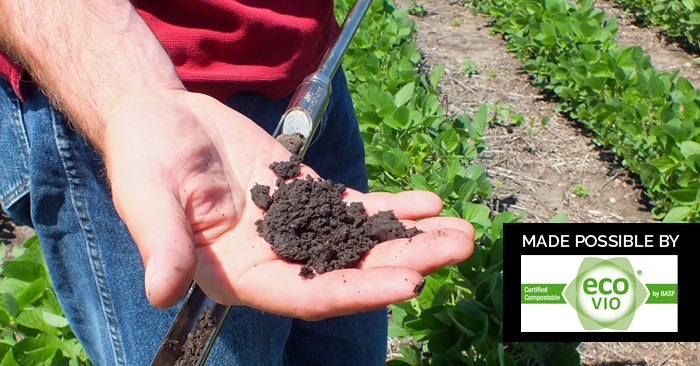EM: So Hunter, as director of the College of Agriculture, Food and Environmental Sciences at Cal Poly – can you tell us a little bit about the situation at Cal Poly regarding composting and training?
HF: Yeah, we have a large agricultural college; it’s the second largest campus in California. We have about six thousand acres here in San Luis Obispo, and an additional three thousand acres in Santa Cruz County. And so…and we have one of the country’s largest agricultural colleges, which means we have a lot of animal units; we have quite a bit of beef cattle, we have a large dairy and we have chickens and horses and so. And because of that we have a lot of manure, and we have developed a compost operation that handles all of our manure and our green waste, and so it’s a good site to do all our trainings in composting, because we have all of the equipment, and so on.
EM: That’s excellent. And your course is taking place very soon isn’t it? When is it starting?
HF: The 24th. It’s the whole week: march 24th through 28th.
EM: Right, okay. And have you been running this training very long?
HF: Well, it’s the second time that we’ve offered it. So, this is a week-long professional development compost training, and as I said, this is the second time we’ll be offering it. We did a week training two years ago in 2012, and it looks like at this point it’ll be an offering that we do every two years or so.
EM: And is your target audience the industry people that are actually working at composting operations?
HF: Yes, or agriculturalists. We have a lot of vineyards in our area, and we have…we are pretty rural, so you’re correct: the target is more people working in industry or in agriculture, or waste management, who are looking for skills either to improve their composting knowledge, or to start new facilities, so. We do have a couple student volunteers who help with it, but as it stands we do not have a composting course in the normal curriculum. So that’s something we’re hoping to develop. The one course that’s in the process of being initiated is a compost and soil-testing course, which is going to be offered through the Soil Science Department, that would focus more on the laboratory techniques for testing compost.
So, that’s exciting. We do have a pretty strong soils department, and as you can imagine, soils is a good way to connect with a lot of the processes involved in compost. And my understanding is that that’s probably about as close as you can get to actual, you know, established academic degree programs that would be focused on composting would be some of the soil science programs around the country. Because as far as I know, no one’s offering a degree in composting per-se.
EM: Right. Well, that’s great though that Cal Poly is starting to bring composting education to the fore in various ways, that’s very promising. And a question to both now: who do you are the key groups that need composting education today?
WC: I believe each sector in our culture and our economy does have a need for some form of composting education. But at this time, the particularly important target audiences for composting education in my mind, would be ag professionals and growers, the agricultural community; some of the more traditional farmers have maintained a form of composting, many of them certainly still do land application of manure and animal bedding, and things like that, but not a lot of them do actual blending and composting and use the compost. With the upsurge of interest in local foods, organic growing, specialty foods and so forth – they’re a prime target audience. As well as, I think, local government officials, because that’s where the policy rubber meets the road. And local government officials can do an awful lot, just with their own contracts for services, their own direct services that they provide.
The third prime group I think would be current waste management professionals. Absolutely, I think those are our target audiences right now. But really, the answer could be everyone; anyone.
HF: Yeah, I would agree with that. I think that was well put. I think on the state level too, in terms of policy makers, there should be more education. Particularly when it comes to aligning some of the overall goals of these different agencies. In California we definitely struggle from the fact that there are a number of environmental regulatory agencies sometimes that don’t…it almost seems as if the policies are not well aligned. So, you know, here the big challenge is the fact that the air quality boards are creating restrictions in terms of monitoring VOC’s, and so forth, that are making permitting of composting facilities difficult in some areas, so at the policy level I think there’s some need for education as well.
EM: Excellent points. And like with Cal Poly, we see more and more universities including organics recycling and composting as part of their curriculums and daily activities as well. Can I ask you both, then, for your clear take on widely including organics recycling in university curriculums especially, possibly even as a stand-alone course. Is it a good idea?
HF: Yeah, I think it would be. I think it would tie into student interests, especially, you know, there is a fairly strong contingent of students who are interested in environmental studies and in recycling, and so on, and…. The other thing that I was thinking about is the fact that a lot of academia across the country, and probably across the world, is paying a lot of lip service to this idea of interdisciplinary studies, and breaking down silos, and, you know, having offerings across departments – and composting is really ideal for that type of education because it draws on a lot of the different disciplines; so everything from soils, to environment, to biology, agronomy, engineering, even marketing, or energy use. It can all be tied into these types of curriculums. So, I think it offers a lot of potential for meeting that student demand and for, you know, engaging the different disciplines. And it also could be a response to a lot of overall social goals too, which is namely to get organics out of the waste stream.
EM: Wynne, do you want to weigh-in on that?
WC: I definitely think that there is a need, and it would be welcomed for colleges and universities to begin to create and teach, and keep on-going formal curriculum built around composting. At this point, I would agree there’s not a lot of formal curriculum and/or even stand-alone certificates or degree programs out there. The non-formal education community has actually done a better job of pulling together the players. And it was already noted that extension is one of key players – certainly here in Illinois, UOI has a strong extension presence and they have a good composting instructional setup and resources online. And there are places like Cornell’s Waste Management Institute that has done a lot of research; I believe that that institute is set up more for research and hands-on involvement for the students in research.
EM: They have a composting site as well, and the campus also has a lot of sustainability and recycling initiatives going on too around the campus. So, you know, that’s really great – they’re at the forefront of sustainability education as well at the moment.
WC: Oh yes, uh-huh.
HF: Yeah.
WC: University of Georgia also has some research going on in vermicomposting at one point, as does SIU Carbondale here in Southern Illinois – they have a major vermicomposting program; they utilise…they grind all of the food scraps from the cafeterias on campus, feed it to worms in an – at least – thousand square foot building, and then take the vermicastings and utilise that on campus. So, it’s a hands-on opportunity for the student workers to be involved, and to learn about it. It’s also that some of the professors there are conducting research and involving students –
EM: Yeah, and another example off the top of my head as well would be the University of Wisconsin-Oshkosh, which does a lot of work with renewable energy – they’ve installed a biogas facility at the university, that’s totally run by the students and provides great training for anaerobic digestion and biogas production – so there’s that as well.
But as you say, there doesn’t seem to be a formal, stand-alone university course or curriculum based around compost – how far away do you think we are from Universities offering these kinds of courses?
WC: There is a change on the horizon, and groups like Compostory.org are helping to usher in that change. I do believe universities and colleges are waking up to the value of multi-disciplinary approaches. The students want it. Hands-on experience is so valuable, along with the research aspect and the higher-order thinking and writing skills. The hands-on stuff and service goes right along with it. And industry, I think, is arriving at the same point as education is, where we see a need for some change, and more collaboration.
EM: And you’re developing a curriculum for Kankakee Community College as well. I was wondering what role do community colleges play in composting education today in the US?
WC: Community colleges have served more-or-less as the “in-between” the universities and industry and trade associations that are providing very specific, very targeted short-term training, you know, for a specific topic. Community colleges can help take that and put that within a context of industry, but also giving academic credit, which then can be build upon for these further certifications, degrees, and so forth. I think that all three levels need to begin to work more closely together, and it is beginning to happen.
The National Recycling Coalition, along with RONA (the former recycling organisation of north America) – in which there are many movers and shakers out there in California, Hunter – put together three years ago a national committee for sustainable resource management learning standards; and from a variety of sectors: business people, processors, academic folks, non-profits…this committee agreed and put together twenty-five standards for learning, which any state recycling organisation, trade association, or college, really, could or should be using if they want to formalise and teach some standardised sustainable resource management – it’s not just recycling coordination anymore.
And they’re brand new, I mean literally hot off the presses. They just were announced and, kind of, finalised late in 2012. There are several state recycling organisations that are considering implementing them, or being more-or-less, quote-on-quote certified to teach sustainable resource management. And again, I’m Vice President of IRA here in Illinois, I am chair of the Certification Committee here; we have a hope and desire of taking these two classes: one is currently being taught through Kankakee Community College online, completely online. The second course will be available this summer. And then the students in that course will be offered the opportunity to test for certification to become a nationally certified sustainable resource manager through IRA – through the Illinois Recycling Association – because we’re using these new learning standards.
Now, I’m kind of putting the cart before the horse because we haven’t formally been accepted yet, but I’m pretty sure we will be. We’re excited about it, we’d like to see it grow and again, in my mind, this collaboration – academically, but also with industry driven, up-to-date, cutting-edge information on best management practices, on current best technology…. That stuff comes from industry, you know? And where industry can collaborate and advise, and – whatever – help provide and create this kind of curriculum, there you will have very valuable curriculum.
EM: Yeah. That’s really great points there, actually. And what would be the outcomes, then, of having such widespread composting education do you think?
WC: The ultimate outcomes? I guess the ideal would be that composting begins to be accepted as an integral part of a sustainability curriculum, as well as any sustainability goals at any local government or community program, any organisation program. That there would be a greater number of jobs specific to composting in the economy as a result of professionalising it academically and, you know, through the trade associations.
And just that…you know, there’s going to be more of a cultural buzz as time goes on. There’s definitely a paradigm shift, a sea change occurring. There is a greater push for sustainable practices that capture and manage natural processes, as part of every day business and as part of our learning and education. So, I just see…including composting education and training at any level – formal or non-formal – that’s the way we’re moving.
EM: Yeah, definitely. And last question now – Wynne, you’re involved in course development – what needs to be done, and what types of support is needed in order to develop such a curriculum?
WC: Well, federal dollars, grant dollars, private foundation dollars; to help a college or a professional trade association…you know, it takes time. I mean, a college course – a university course – the general rule of thumb is that it takes twenty-five weeks full-time to develop a new course from scratch. Two courses – you’re talking a full year just to develop two new courses, and that would include researching all the existing stuff that’s out there right now. That’s a chunk of someone’s time. So that’s valuable, you know? And the knowledge of how to pool all those resources together, and…. So anyway, what’s needed is support for the college or the trade association to be able to do that.
HF: Yeah, and that’s actually how we got our compost training that we’re doing here next week. Originally the first year’s offering was funded by a grant from the USDA SARE program – which is the US Sustainable Agriculture Research and Education – they funded the first training in 2012. And then, this current training, we have also received some funding from a local charitable foundation, the Miossi Foundation, so…
WC: Yeah. So there are often grants available through federal agencies, through colleges, to help with something like that. Honestly, unless trade associations have a 501 C3 designation, I doubt that they would, many of them would be eligible for a lot of the larger foundation grants. But small grants, even, can help. So, getting a little bit of funding together to begin with is a key start.
But beyond: assuming you have somebody that’s going to drive the bus and dedicate a significant amount of time to it, then begin researching. You would have to begin researching the curriculum that’s already out there, the industry and trade association-type trainings that’s already out there. I already researched – I don’t believe there are learning standards out there, but that would be a great thing to begin to pull together. You know: what would be the learning outcomes of such a training. I.D. the proponents in your area: those that are interested for environmental reasons, as well as those who are interested because it could be a value-added operation for their existing business. Fill in the blanks; bring them to the table and fill in the blanks. Decide what training is already available, where we need to go, and then fill in the blanks in-between; what the students should know, and how to get it to them.
And I’m a firm believer, as Hunter is, that a blend of formal resources and some classroom learning, with the science behind it…. Compost is perfectly suited for STEM: for science, technology, engineering and math – all of those skills can easily be applied when studying and/or implementing composting. So: bring everybody to the table, come up with a good product, with very specifically identified learning outcomes…someone is going to pick it up somewhere along the line. That would be my advice.
EM: It’s great advice. And that’s all we have time for today now, so I want to thank you both for coming on the show to talk to us.
WC & HF: Thank you.
EM: Okay all the best now, bye!


